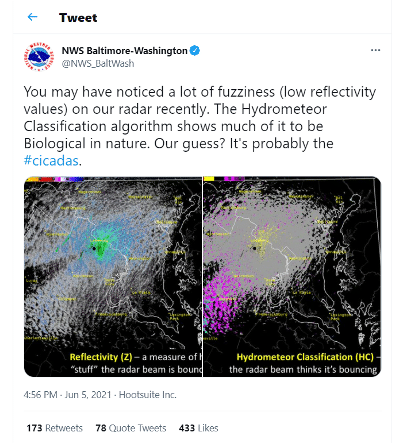There are billions of Brood X cicadas swarming the Midwest and the East over the past few months, emerging from the Smokies (and backyards in Pigeon Forge and Gatlinburg) around May. They’re big and dopey (and little weird looking), and generally harmless to people. But because of the sheer size of the swarms this year, they have become problematic in unexpected ways.
For example, members of the press who were scheduled to cover President Joe Biden’s first overseas trip were delayed by more than six hours because of cicadas causing an issue in an engine of their plane. The cicadas kept periodically flying into the small turbine engine of the plane, which rendered it unable to be used.
And then, on June 5, 2021, the National Weather Service outlet for Baltimore-Washington tweeted the following:

“You may have noticed a lot of fuzziness (low reflectivity values) on our radar recently. The Hydrometeor Classification algorithm shows much of it to be Biological in nature. Our guess? It’s probably the #cicadas.”
So why are we talking about cicadas today? Because sometimes a natural event, like a thunderstorm or snow, can make the roads in Sevier County dangerous, increasing the risk of a crash. Deer, squirrels, birds, lost pets and other animals can also wreak havoc on drivers all throughout Tennessee. As it turns out, cicadas can do the very same thing.
A cicada flew into the vehicle through an open window and hit an Ohio driver in the face. The impact with the cicada caused the driver to lose control of their vehicle and crash it into a pole.
“Many people are just unduly afraid of insects, so if one flies in the window, they may panic and not pay attention to driving,” Doug Pfeiffer, a fruit entomologist at Virginia Tech, said. “There’s an emotional overreaction, in addition to some real problems that could crop up when there are insects in very high numbers.”
Can I be held liable if a cicada flies into my car while I’m driving Gatlinburg?
Yes, you can. Much like you can be held liable if you were driving negligently in bad weather and cause a crash, you could also be held accountable if you lose control of your car because of a cicada.
If an insect, bird, or other animal gains access to your vehicle while you are driving, it can turn into a serious situation. If you fail to pay attention you could crash the vehicle, causing serious injury to yourself, your passengers, and others around you. The accident could even lead to a fatality. Be sure to do the following when a critter enters your vehicle while it is in motion:
- Keep your eyes on the road and not the bug, bird, or animal.
- If it is a flying insect, open the windows so it has a means of escape.
- Pull to the side of the road when it is safe and only exit the vehicle if there is no oncoming traffic.
- If the critter is still in the vehicle, but is an insect, bee, or spider, you should be able to remove it yourself.
- If the critter is a snake or rodent, you might need to call a wildlife expert to have it removed from your vehicle without suffering any harm.
Preventing critters from gaining access to your vehicle
You can take matters into your own hands to prevent cicadas (and other unwanted creatures) from gaining access to your vehicle. Take the following steps:
- Always close your car’s windows at night
- Never leave food in your vehicle
- Bang on the hood before entering or starting the vehicle to scare off any animals that might have slept overnight near the engine
- When traveling with a pet make sure it is secured in a cage or a seat belt so that it does not cause a distraction
- Do not drive with your windows open
How to prevent animals from entering a vehicle’s engine
The best way to prevent animals from nesting near your vehicle’s engine is to grab a net bag and fill it with moth balls. Hang the bag under the hood near the engine but away from any parts that get hot, so it does not catch fire. The bag should also be hung away from any air intakes to avoid the smell entering the cabin of the vehicle. Remove the bag when the vehicle is being used and replace it when the vehicle is no longer in use.
Most animals do not like the smell emitted by moth balls, which helps keep them away from the engine. Even with this in place you should still open the hood of the vehicle every so often to check for animals living under there or building a nest. If you’ve had pest problems in the past, set traps near your vehicle when it is parked on your property. This can help prevent animals from accessing your vehicle’s engine completely. Cayenne pepper or hot chili pepper can also be sprinkled on the ground surrounding the vehicle to deter rodents and pests.
Have you been injured in a car accident in or near Gatlinburg? It’s time to protect your rights by calling the personal injury attorneys at Delius & McKenzie, PLLC at 865-428-8780, or completing a contact form on our website. We are located in Sevierville, but serve clients in Gatlinburg, Pigeon Forge, the Tri-Cities, and Seymour.

Attorney Bryan E. Delius was born and raised in Sevier County, TN. He founded Delius & McKenzie more than 20 years ago, after receiving his JD from the University of Tennessee at Knoxville. He is admitted in Tennessee and in several federal court systems. Learn more about Bryan E. Delius.




